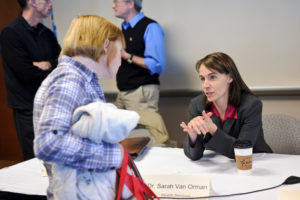For nearly a decade, Sarah Van Orman has helped UW–Madison navigate some of the toughest issues around: high-risk drinking, sexual assault, student mental health and meningitis, not to mention the occasional outbreak of norovirus.
The director of University Health Services (UHS) departs this month to take on a new role as the associate vice provost for student affairs and chief student health officer at the University of Southern California. Before departing, Van Orman shared thoughts on her UW years.
She will be replaced on an interim basis by associate directors Bill Kinsey and Arnie Jennerman until a search can be conducted for a new director.
The following interview was edited for space and clarity.
Over 10 years, what’s the biggest thing you’ve seen change in your estimation?
I think we’ve had a vision for health on campus and I think we’ve been successful advancing a certain perspective for opportunities to look at health broadly and take a community and public health view of how we solve problems. We’ve really tackled some big challenges we know impact students, employees and visitors … sexual assault, high risk alcohol use, occupational lab and classroom safety, mental health. We’ve tried to tackle those problems using a comprehensive perspective and made some progress. That’s an exciting thing to say.

Which of those do you feel proudest of?
Alcohol, our data from last fall shows some significant drops in high-risk consumption among our first-year students and certainly there’s some national trends in that area, but I think that’s the first time in 20 years campus has been able to make some inroads. That’s not me or UHS, but a collaboration — Housing, (UW) Police Department, the Division of Student Life, the Wisconsin Union, University Communications and many others. I do feel we’ve been able to assist with that and get good data and use evidence-based strategies.
It seems like we have more data and knowledge of the campus environment.
Medical and mental health services are a big part of what we do, but when I took this job one of the pieces of the job is chief health officer of the university, and I took that title really seriously in terms of being the public health leader.
That perspective has to do with this continual cycle of assessing your population, your community and environment for health issues, gathering data on it, identifying areas for concern, gathering stakeholders, implementing evidence-based programs and services, evaluating and going back through the cycle again. That’s the public health planning cycle, and I think that’s what we’ve tried to build here at UHS as an organization.
Is there one of those areas that you wish you could stay to see through the positive changes?
We’ve done some really good things in mental health. In the next year or two, with increased staffing levels, I think there are some good things coming. It’s been a huge issue nationally and very challenging. Also, I feel like we’ve teed up some good work in sexual violence prevention and in improving the delivery of occupational health and medicine services.
You’ve dealt with large, thematic issues, but you’ve kept a steady hand through it all.
It’s a balance — it’s important to respond to people, whether that’s people who are sick and need to come in, people who are experiencing a mental health crisis who need care, or an outbreak that needs attention, you absolutely have to take care of people.
But you always need to make sure you have resources and are keeping an eye on the longer-term issues. That is a challenge. How do you respond to the short-term needs while really keeping your eye focused on the longer-term work? Otherwise you always stay in a reactive mode and you don’t actually make progress. That’s one of the things we’ve tried to build here — the ability to stay in both spaces.
If you were staying and there was one area you could choose to address, what would it be?
Campus climate. We view it as a health and well-being issue. We have lots of data to show it impacts people’s emotional and physical health. That’s a good example of how it’s important to respond to individual incidents, but if we spend our time focused on those incidents (and not culture change), we’re not going to get to where we want to be.
– See more at: http://news.wisc.edu/exit-interview-university-health-services-director-sarah-van-orman/#sthash.V7dlC1Vo.dpuf